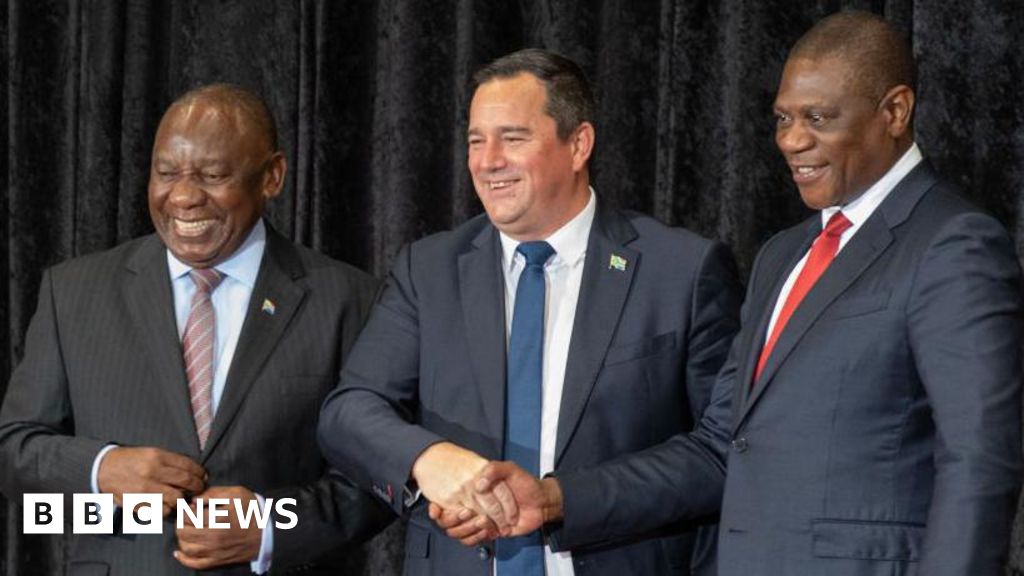S Africa president fires stinging rebuke at coalition partner

South Africa's Coalition Government Tested as President Ramaphosa Rejects DA's "Ultimatums"
President Cyril Ramaphosa has issued a firm rebuke to the Democratic Alliance (DA), a key partner in South Africa's Government of National Unity (GNU), stating he "will not yield to threats and ultimatums." The statement follows the removal of DA member Andrew Whitfield from his position as Deputy Trade Minister over an unauthorized trip to the United States, escalating tensions within the coalition formed after inconclusive elections earlier this year.
The DA, the second-largest party in the GNU, has demanded the removal of other ministers and deputy ministers from different parties who they deem to be "errant," threatening to withdraw from the coalition if their demands are not met. This latest dispute highlights the fragility of the GNU and raises questions about its long-term stability.
Whitfield's Removal Sparks Controversy
Ramaphosa defended his decision to dismiss Whitfield, citing a "clear violation of the rules and established practices governing the conduct of members of the executive." According to presidential guidelines, all international travel by ministers and deputies requires express permission from the president. Ramaphosa stated he had informed DA leader John Steenhuisen prior to Whitfield's removal and offered the party a replacement deputy minister position.
However, the DA has accused Ramaphosa of applying a "flagrant double standard," suggesting ulterior motives behind the dismissal. Whitfield himself acknowledged that his US trip, undertaken at the behest of his party, lacked presidential approval, conceding it may have been an "error in judgment." He also echoed Steenhuisen's concerns, labelling his firing "premature and an unnecessary provocation."
Coalition Under Strain: A History of Disagreements
The GNU was formed after the African National Congress (ANC) lost its outright majority in the May 2024 general election, forcing it to seek coalition partners. The DA is one of ten parties that joined the GNU, but relations between the ANC and DA have been fraught with disagreements from the outset. One significant point of contention arose earlier this year when the DA refused to support a crucial vote on the national budget in parliament, leading the ANC to accuse them of "complete betrayal."
The current crisis underscores the inherent challenges of coalition governments, particularly in a country as diverse and politically complex as South Africa. "Coalition governments are inherently unstable, requiring constant negotiation and compromise," says Dr. Susan Booysen, a political analyst at the Mapungubwe Institute for Strategic Reflection (MISTRA). "The ANC and DA represent fundamentally different ideologies and constituencies, making sustained cooperation difficult. This incident highlights the deep-seated mistrust and divergent priorities within the GNU."
Historical Context: Mandela's Precedent
Ramaphosa cited Nelson Mandela's removal of Winnie Madikizela-Mandela as deputy president in 1995 for similar reasons as precedent for his decision. This reference highlights the constitutional powers of the president regarding the appointment and removal of executive members. However, some observers argue that invoking Mandela's name in this context is a political maneuver aimed at legitimizing a potentially divisive decision.
The situation also draws parallels to other instances of coalition governments in African history, where ideological differences and power struggles have often led to instability and collapse. "Many African countries have experimented with coalition governments, often with mixed results," notes Professor Adebayo Olukoshi, a researcher at the Institute for Global Dialogue. "The key to success lies in strong leadership, clear policy frameworks, and a willingness to prioritize national interests over partisan agendas. The current situation in South Africa suggests that these elements may be lacking."
Future of the GNU Uncertain
The DA has yet to formally announce its decision regarding its continued participation in the GNU. Whitfield indicated that leaving the coalition is one of the options being considered. A DA withdrawal would significantly weaken the GNU and could potentially trigger a new round of political instability. The ANC would then need to seek alternative coalition partners, further complicating the political landscape.
The coming days will be crucial in determining the future of South Africa's coalition government. Whether the ANC and DA can find a way to bridge their differences and rebuild trust remains to be seen. The stability of the GNU, and indeed the country, hinges on their ability to do so.
Originally sourced from: BBC News Africa
